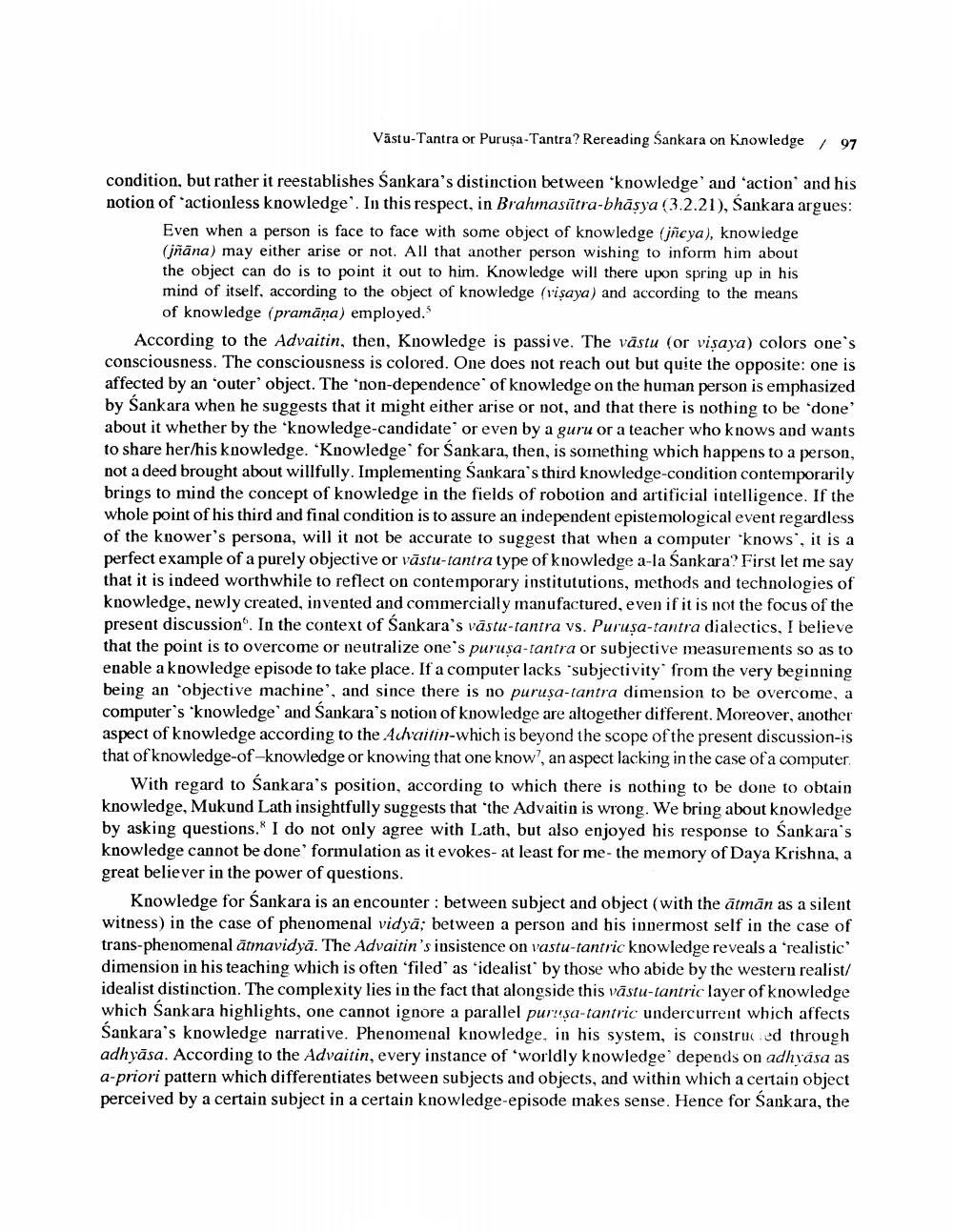________________
Västu-Tantra or Puruşa-Tantra? Rereading Sankara on Knowledge/ 97
condition, but rather it reestablishes Sankara's distinction between 'knowledge' and 'action' and his notion of 'actionless knowledge'. In this respect, in Brahmasūtra-bhāṣya (3.2.21), Sankara argues:
Even when a person is face to face with some object of knowledge (jñeya), knowledge (jñāna) may either arise or not. All that another person wishing to inform him about the object can do is to point it out to him. Knowledge will there upon spring up in his mind of itself, according to the object of knowledge (visaya) and according to the means of knowledge (pramana) employed."
According to the Advaitin, then, Knowledge is passive. The vastu (or visaya) colors one's consciousness. The consciousness is colored. One does not reach out but quite the opposite: one is affected by an 'outer' object. The 'non-dependence of knowledge on the human person is emphasized by Sankara when he suggests that it might either arise or not, and that there is nothing to be 'done' about it whether by the 'knowledge-candidate or even by a guru or a teacher who knows and wants to share her/his knowledge. 'Knowledge' for Sankara, then, is something which happens to a person, not a deed brought about willfully. Implementing Sankara's third knowledge-condition contemporarily brings to mind the concept of knowledge in the fields of robotion and artificial intelligence. If the whole point of his third and final condition is to assure an independent epistemological event regardless of the knower's persona, will it not be accurate to suggest that when a computer 'knows", it is a perfect example of a purely objective or vastu-tantra type of knowledge a-la Sankara? First let me say that it is indeed worthwhile to reflect on contemporary institututions, methods and technologies of knowledge, newly created, invented and commercially manufactured, even if it is not the focus of the present discussion. In the context of Sankara's vāstu-tantra vs. Purușa-tantra dialectics, I believe that the point is to overcome or neutralize one's purușa-tantra or subjective measurements so as to enable a knowledge episode to take place. If a computer lacks 'subjectivity" from the very beginning being an objective machine', and since there is no purușa-tantra dimension to be overcome, a computer's 'knowledge and Sankara's notion of knowledge are altogether different. Moreover, another aspect of knowledge according to the Advaitin-which is beyond the scope of the present discussion-is that of knowledge-of-knowledge or knowing that one know?, an aspect lacking in the case of a computer
With regard to Sankara's position, according to which there is nothing to be done to obtain knowledge, Mukund Lath insightfully suggests that "the Advaitin is wrong. We bring about knowledge by asking questions. I do not only agree with Lath, but also enjoyed his response to Sankara's knowledge cannot be done' formulation as it evokes- at least for me- the memory of Daya Krishna, a great believer in the power of questions.
Knowledge for Sankara is an encounter: between subject and object (with the ātmān as a silent witness) in the case of phenomenal vidya; between a person and his innermost self in the case of trans-phenomenal atmavidya. The Advaitin's insistence on vastu-tantric knowledge reveals a 'realistic' dimension in his teaching which is often 'filed' as 'idealist by those who abide by the western realist/ idealist distinction. The complexity lies in the fact that alongside this västu-tantric layer of knowledge which Sankara highlights, one cannot ignore a parallel purusa-tantric undercurrent which affects Sankara's knowledge narrative. Phenomenal knowledge. in his system, is construed through adhyasa. According to the Advaitin, every instance of "worldly knowledge' depends on adhyasa as a-priori pattern which differentiates between subjects and objects, and within which a certain object perceived by a certain subject in a certain knowledge-episode makes sense. Hence for Sankara, the




